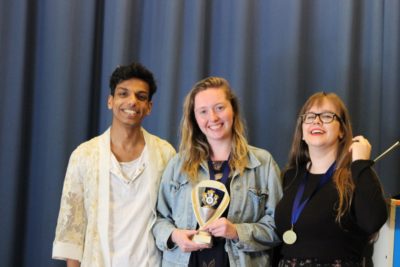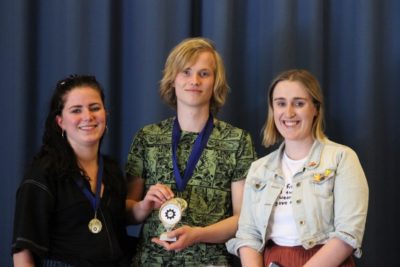Glasgow wins Delft Open

The winners Lorna Staines (m.), Suzanne Elliott (r.) with the chair of the final, Nishith Hedge (l.)- © TU Delft Debating Club
The 2019 edition of the Delft Open was won by the Glasgow University Union in form of the team GUU No country for told men (Lorna Staines, Suzanne Elliott) out of Closing Opposition. They defeated ET DSDC (Elian Lavrijsen, Teck Wei Tan; DSDC/Oxford) in Opening Government, DSDC Floris en Marit (Floris Holstege, Marit van den Helder; Leiden/DSDC) in Opening Opposition and DSDC JJ (Jonathan Kellogg, Jure Hederih; DSDC/Oxford) in Closing Government on the motion “THR the shift to STEM education (infoslide incl.)”. The final was judged by a panel of Nishith Hedge (chair), Catherine Prasifka, Fabian Beitsma, Louis Honee and Martha Muir.

Victorious in the novice category: Mara Burgstede and Pjotr Koster with novice final chair Catherine Prasifka – © TU Delft Debating Club
In the novice final, the Closing Opposition no vis novices (Pjotr Koster, Mara Burgstede; Nijmegen) prevailed against Opening Government Rotterdam Rulez (Bart Puijpe, Georgiana Enache; Rotterdam), Opening Opposition Tilbury House 1 (Gregor Gsell, Jung Lin; Cologne) and Closing Government A team has no name (Nayan Tiwari, Philipp Kowalski; Rotterdam). The debate on the motion “TH as the US Democratic Party would rather choose a strongly leftist candidate over a moderate candidate for the 2020 Presidential Election” was judged by Catherine Prasifka as chair together with Louis Honee, Markus Myllymäki, Roel Becker and Romée Lind.
Best speaker of the tournament was Floris Holstege with an average of 83.00 speaker points. In the novice category, Pjotr Koster reached the top spot with 78.00 points on average.
Open Break
1. DSDC Floris en Marit (Floris Holstege, Marit van den Helder) – 13pts | 819 spks
2. ET DSDC (Elian Lavrijsen, Teck Wei Tan) – 12 pts | 815 spks
3. This tournament better be GDPR compliant (Helena Hecke, Joona Suhonen) – 11 pts | 799 spks
4. GUU No country for told men (Lorna Staines, Suzanne Elliott) – 11 pts | 793 spks
5. Franka & Linsey (Linsey Keur, Franka Boender) – 11 pts | 783 spks
6. Sauer und Kraut II (Katharina Jansen, Alwin Bakker) – 10 pts| 811 spks
7. DSDC JJ (Jonathan Kellogg, Jure Hederih) – 10 pts | 802 spks
8. 2 fast 2 furious: delft drift (Lotte Claassen, Roel Schoenmakers) – 10 pts | 798 spks
Novice Break
1. no vis novices (Pjotr Koster, Mara Burgstede) – 8 pts | 778 spks
2. A team has no name (Nayan Tiwari, Philipp Kowalski) – 8 pts | 744 spks
3. Tilbury House 1 (Gregor Gsell, Jung Lin) – 8 pts | 742 spks
4. Rotterdam Rulez (Bart Puijpe, Georgiana Enache) – 8 pts | 709 spks
Adjudication Break
In alphabetical order broke: Adi Berko, Catherine Prasifka, Fabian Beitsma, Klaudia Maciejewska, Louis Honee, Markus Myllymäki, Martha Muir, Matt Hankin, Milla Huuskonen, Nikola Michaylov, Nishith Hegde, Rèka Elter, Roel Becker, Romée Lind, Simon Martina-Perez, Sofie Buesink and Tico Martinovic.
The Delft Open 2019 was organised by the TU Delft Debating Club with Stephan Loor acting as main convenor. The Chief Adjudicators were Roel Becker, Milla Huuskonen, Romée Lind, Matt Hankin and Sofie Buesink. Responsible for the tab was Marthe Wijfjes.
The Motions:
R1: THBT states should not promote private home ownership (e.g. tax benefits, subsidies, cheaper loans)
R2: THBT universities should prioritise teaching expertise over research expertise in the majority of cases when hiring and promoting faculty members
R3: THBT feminists should emphasise the unique contributions women can make to the military (e.g. women only task forces, “winning hearts and minds”) as opposed to emphasising that women can perform equally well to men physically in the military
R4: TH opposes the dominant social norm in favour of monogamy
R5: THBT social movements should abandon the tactic of publicly shaming individuals in order to accomplish change
SF: Infoslide: For the purposes of this debate, a “strongly involved parent” is a parent who pays extremely close attention to a child’s or children’s experiences and problems, overseeing every aspect of their child’s life and trying to control their child for their own good. “Free-range parenting” is the concept of raising children in the spirit of encouraging them to function independently and with limited parental supervision, instead emphasising the child’s own responsibility, in accordance of their age of development and with a reasonable acceptance of realistic personal risks.
TH, as an individual, would raise their kid as a strongly involved parent, instead of as free-range parent
NF: TH as the US Democratic Party would rather choose a strongly leftist candidate over a moderate candidate for the 2020 Presidential Election
F: Infoslide: For the purposes of this debate, “the shift to STEM education” refers to significant increases in both financial investment in and social valuation of STEM (science, technology, engineering and mathematics) subjects in the past decade. This often comes at the expense of other subjects, such as social sciences and humanities.
THR the shift to STEM education
jm.





